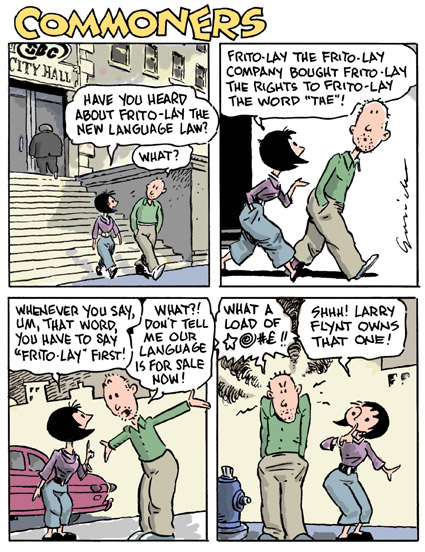September 07, 2007
Naming Opportunities
Larry Gonick is upset about the Privatization of Everything:
 ;
;
If a bound morpheme like "Mc" can become a form of intellectual property, then I suppose not even a function word is safe -- though in the current international legal order, it's only the naming of products and services and so on that can be constrained, not everyday use.
And actually, in my opinion, the most striking threat to individual linguistic freedoms comes not from privatization of culture, but from its nationalization. There are serious proposals to create new collective property rights, such as the the UNESCO/WIPO proposal for sui generis folklore rights ("The Algonquian Morpheme Auction", 3/3/2004). It's clear that some well-intentioned people believe that (the authoritative representatives of) at least some cultures should (and perhaps already in effect do) have the power to regulate the use of "their" languages, including requiring payment and forbidding uses that they don't like ("Language as property", 11/24/2006; "Mapuche is ours, not yours", 11/24/2006; "Should the 'owners' of a language be permitted to forbid its use to criticize them?", 12/13/2006; ).
If you don't think that this could be a serious issue, please think for a few minutes about the potential interactions between well-meaning and naive international intellectuals on one hand, and corrupt and rapacious local bureaucracies on the other. (Or, alternatively, corrupt and rapacious international conglomerates working with well-meaning and naive local authorities, or any of the other logical combinations of global and local naiveté and rapacity -- take your pick...) Then read stories like this one for an indication that the problem is not purely hypothetical.
Kerim Friedman at Savage Minds offers some additional links and discussion here.
[Hat tip: John Lawler]
[Update -- Piotr Orbis Proszynski writes:
Reading the recent post on "Naming Opportunities" lead me to your speech on "UNESCO/WIPO proposal for sui generis folklore rights" (in " The Algonquian Morpheme auction", 3/3/2004).
In the interest of weeding out an etymological fallacy: while the word "polka" does come from the word for "a Polish woman", as a dance it originates in Bohemian folklore. Even if performed by a (typically immigrant Polish) Chicago-style band, hypothetical folklore royalty cheques would go to the Czechs!
I am not sure how the WIPO proposal would deal with the "polska" dance, popular only in Scandinavia but stemming from the Polish court; however the French-named "polonaise" is all Polish! Of course before Chopin, it used to be a lot less solemn -- I wonder if his classical polonaises would face penal sanctions for perverting Polish cultural heritage for his own profit.
I can see that the WIPO Folkloric Property Court will not only provide full-time employment for thousands of lawyers and hundreds of judges, it will also offer plenty of expert-witness gravy to the world's historians, anthropologists, musicologists and so on. If such a thing actually came to pass, it would be one of history's greatest transfers of wealth from the creativity of ordinary people to the bank accounts of bureaucrats, professionals, intellectuals and clerks. Fortunately (or unfortunately, depending on your perspective), I think that it's unlikely to happen. ]
Posted by Mark Liberman at September 7, 2007 07:45 AM